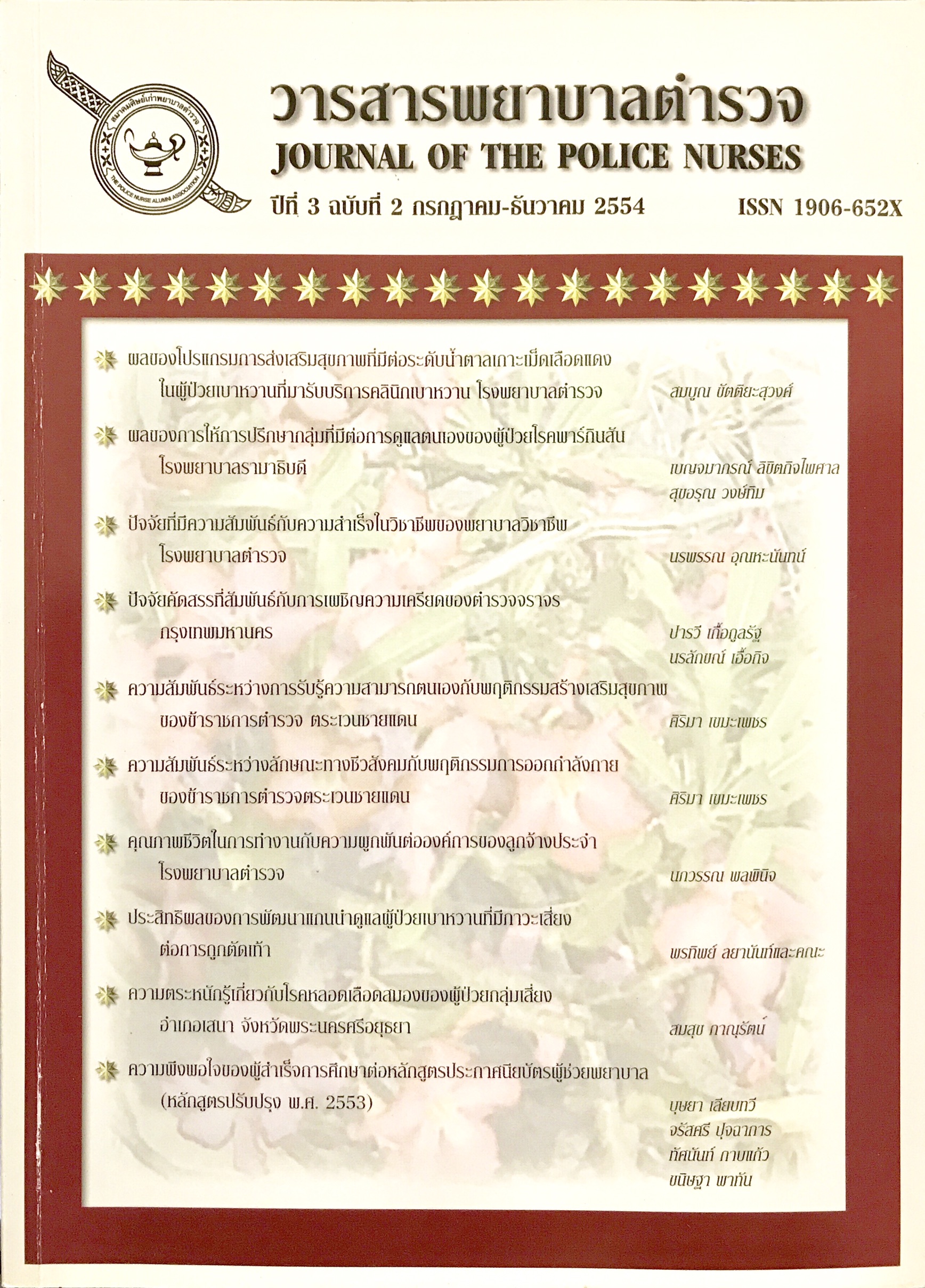ปัจจัยคัดสรรที่สัมพันธ์กับการเผชิญความเครียดของตำรวจจราจร กรุงเทพมหานคร
Keywords:
การเผชิญความเครียด, ตำรวจราจร, Coping, Traffic policemenAbstract
บทคัดย่อ
การวิจัยเชิงสหสัมพันธ์นี้ มีวัตถุประสงค์การวิจัยเพื่อศึกษาความสัมพันธ์ระหว่างปัจจัยคัดสรร ได้แก่ สถานภาพสมรส ประสบการณ์ในการทำงาน การรับรู้ภาวะสุขภาพ สิ่งแวดล้อมในการทำงาน และการสนับสนุนทางสังคม กับการเผชิญความเครียดของตำรวจจราจร กรุงเทพมหานคร กลุ่มตัวอย่าง คือ ตำรวจจราจร อายุ 24-60 ปี จำนวน 345 คน โดยการสุ่มแบบหลายขั้นตอน เครื่องมือที่ใช้ ได้แก่ แบบสอบถามการรับรู้ภาวะสุขภาพ สิ่งแวดล้อมในการทำงาน การสนับสนุนทางสังคมจากผู้บังคับบัญชา เพื่อน-ผู้ร่วมงาน ครอบครัว และแบบสอบถามการเผชิญความเครียดด้านการจัดการกับปัญหาและการจัดการกับอารมณ์ ผ่านการตรวจความตรงตามเนื้อหา และหาความเที่ยงได้เท่ากับ 0.80, 0.85, 0.96, 0.97, 0.97, 0.89, และ 0.91 ตามลำดับ วิเคราะห์ข้อมูลโดยหาค่าร้อยละ ค่าเฉลี่ย ส่วนเบี่ยงเบนมาตรฐาน ค่าสหสัมพันธ์พอยด์ไบซีเรียล และค่าสัมประสิทธ์สหสัมพันธ์แบบเพียร์สัน ผลการวิจัยสรุปได้ ดังนี้
1) สถานภาพสมรส และประสบการณ์การทำงาน ไม่มีความสัมพันธ์กับการเผชิญความเครียดด้านการจัดการกับปัญหาและด้านการจัดการกับอารมณ์
2) การรับรู้ภาวะสุขภาพมีความสัมพันธ์ทางบวกกับการเผชิญความเครียดด้านการจัดการกับปัญหาและด้านการจัดการกับอารมณ์ (r = 0.26 และ 0.23, p < 0.01 ตามลำดับ)
3) สิ่งแวดล้อมในการทำงานมีความสัมพันธ์ทางบวกกับการเผชิญความเครียดด้านการจัดการกับปัญหาและด้านการจัดการกับอารมณ์ (r = 0.21 และ 0.24, p < 0.01 ตามลำดับ)
4) การสนับสนุนทางสังคมจากผู้บังคับบัญชา และเพื่อน-ผู้ร่วมงานมีความสัมพันธ์ทางบวกกับการเผชิญความเครียดด้านการจัดการกับปัญหาและด้านการจัดการกับอารมณ์ (r = 0.19 และ 0.30 ตามลำดับ) และ (r = 0.28 และ 0.23, p < 0.01 ตามลำดับ) การสนับสนุนทางสังคมจากครอบครัวมีความสัมพันธ์ทางบวกกับการเผชิญความเครียดด้านการจัดการกับปัญหา (r = 0.16, p < 0.01) แต่ไม่สัมพันธ์กับการเผชิญความเครียดด้านการจัดการกับอารมณ์ (r = 0.02, p = 0.67)
SELECTED FACTORS RELATED TO COPING OF THE TRAFFIC POLICEMEN, BANGKOK METROPOLIS
Abstract
The purposes of this correlational research were to investigate the relationships among marital status, working experience, perceived health, environment of working, and social support with coping were 345 traffic policemen of 27 stations, aged 24-60 years old. The subjects recruited by a multistage sampling. Questionnaires were demographic information, perceived health, environment of working, social support, and coping. All questionnaires were tested for content validities and reliabilities were 0.80, 0.85, 0.96, 0.97, 0.97, 0.89, and 0.91, respectively. Descriptive statistics (e.g., percent, mean, and standard deviation), Point Biserial correlation and Pearson‘s Product Moment correlation were used to analyze data. The results showed followings:
1) There were no relationships between marital status and coping, and working-
experience and coping among traffic policemen.
2) There was positive statistically significant relationships between perceived health with problem and emotion management (r = 0.26 and 0.23, p < 0.01) and positive statistically significant relationships between environment of working with problem and emotion management. (r = 0.21 and 0.24, p < 0.01).
3) There was positive statistically significant relationships between social support from
commanders with problem and emotion management (r = 0.19 and 0.30, p < 0.01) and positive statistically significant relationships between social support (friends/co-workers) with problem and emotion management (r = 0.28 and 0.23, p < 0.01) and positive statistically significant relationships between social support (family) with problem management (r = 0.02, p < 0.01) but there was no relationships with emotion management at the level of .05 (r = 0.02, p = 0.67).
Downloads
Downloads
How to Cite
Issue
Section
License
ผลงานที่ได้ตีพิมพ์แล้วจะเป็นลิขสิทธิ์ของวารสารพยาบาลตำรวจ















